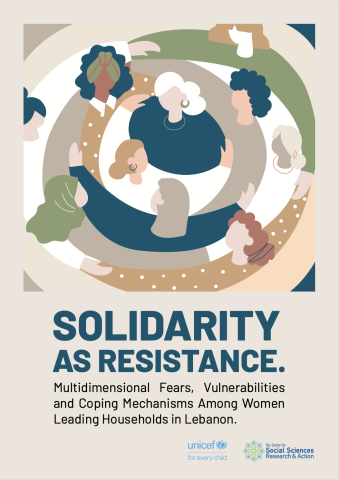Solidarity As Resistance. Multidimensional Fears, Vulnerabilities and Coping Mechanisms Among Women Leading Households in Lebanon. | التضامُن كفعل مقاومة في وجه الأزمات. الخوف المتعدد الجوانب والهشاشة وآليات التكيّف بين النساء المعيلات لأسرهنّ في لبنان.

This ethnographic study looks at the trajectories and lived experiences of women leading households in Lebanon. It focuses on their challenges and coping mechanisms throughout the economic crisis that unfolded as of the end of 2019. It provides an in-depth investigation of the trajectories of eleven women leading households. Drawing from a qualitative methodology mostly based on semi-structured in-depth interviews conducted with these women, the analysis covers different aspects of their lives such as socio-economic conditions, work and education, social networks, perceptions of fear and insecurity, and focuses on their coping mechanisms, as well as on their dreams, hopes, and perspectives. Thus, the paper seeks to provide insights on the living conditions of these women from the perspective of their own experiences and views. They all perceive their situation as difficult and feel overwhelmed by their multiple responsibilities, their feelings of fear and instability, and the lack of structural support.
These multi-leveled and intersecting structures and experiences of discrimination, violence, and marginalization seem to appear like a vicious circle, that interviewed women constantly navigate to survive but that they cannot break. Therefore, coping mechanisms seem at a first glance mainly to be reduced to emotional responses such as “being strong” or “being resilient” and “managing against all odds”. Still, the interviewed women also cope by referring to informal women networks of solidarity and interpersonal relations.
تبحث هذه الدراسة الاثنوغرافية في المسارات والتجارب التي تعيشها النساء اللواتي يُعِلْنَ أسرهنّ في لبنان، كما تُركّز على التحديات وآليات التكيّف خلال الأزمة الاقتصادية التي بدأت منذ أواخر العام ۲٠۱۹.
تُقدّم الدراسة نظرةً معمّقة على مسارات إحدى عشرة امرأة مُعيلة، كما أنها مبنيّة على منهجية نوعية تعتمد بالدرجة الأولى على مقابلات معمّقة وشبه منظّمة أُجريت مع هؤلاء النساء. يغطي التحليل جوانب مختلفة من حياتهنَّ، مثل الظروف الاجتماعية-الاقتصادية، والعمل والتعليم، والشبكات الاجتماعية، والشعور بالخوف وانعدام الأمن، إلى جانب التركيز على آليات التكيُّف التي يعتمدنَها، وكذلك على أحلامهنَّ وآمالهنَّ ووجهات نظرهنَّ. بالتالي، تسعى الدراسة إلى إلقاء الضوء على الظروف المعيشية لهؤلاء النساء من خلال تجاربهنّ وآرائهنّ. جميعهنَّ يرَوْنَ أن وضعهنَّ صعب وتُثقل كاهلهنَّ المسؤوليات المتعددة فضلًا عن الشعور بالخوف وعدم الاستقرار وقلة الدعم الهيكلي.
تبدو هذه الهيكليات والتجارب المتقاطعة والمُوزَّعة على عدّة مستويات من التمييز والعنف والتهميش وكأنها حلقة مفرغة تتجاوزها النساء اللواتي تمت مقابلتهنَّ باستمرار، ولكنّهنّ يعجزنَ عن كسرها. لذلك، يبدو للوهلة الأولى أن آليات التكيُّف تقتصر بشكل أساسي على ردود الفعل النفسية مثل "التحلي بالقوة" أو "التحلي بالمرونة" و"تدبير الأمور رغم كل الصعوبات". ومع ذلك، تتكيّف هؤلاء النساء أيضًا من خلال الاستعانة بشبكات التضامن النسائية غير الرسمية والعلاقات الشخصية، بدءًا بالأصدقاء، مرورًا بالزميلات، وصولًا إلى النساء الأخريات في ظروف مماثلة. تصف النساء اللواتي تمت مقابلتهنَّ هذه الشبكات على أنها مصدر قوتهنَّ ومصدرٌ للراحة فضلًا عن كونها مصدرًا للدعم الاستراتيجي وبالتالي الصمود ومقاومة الأزمات.

